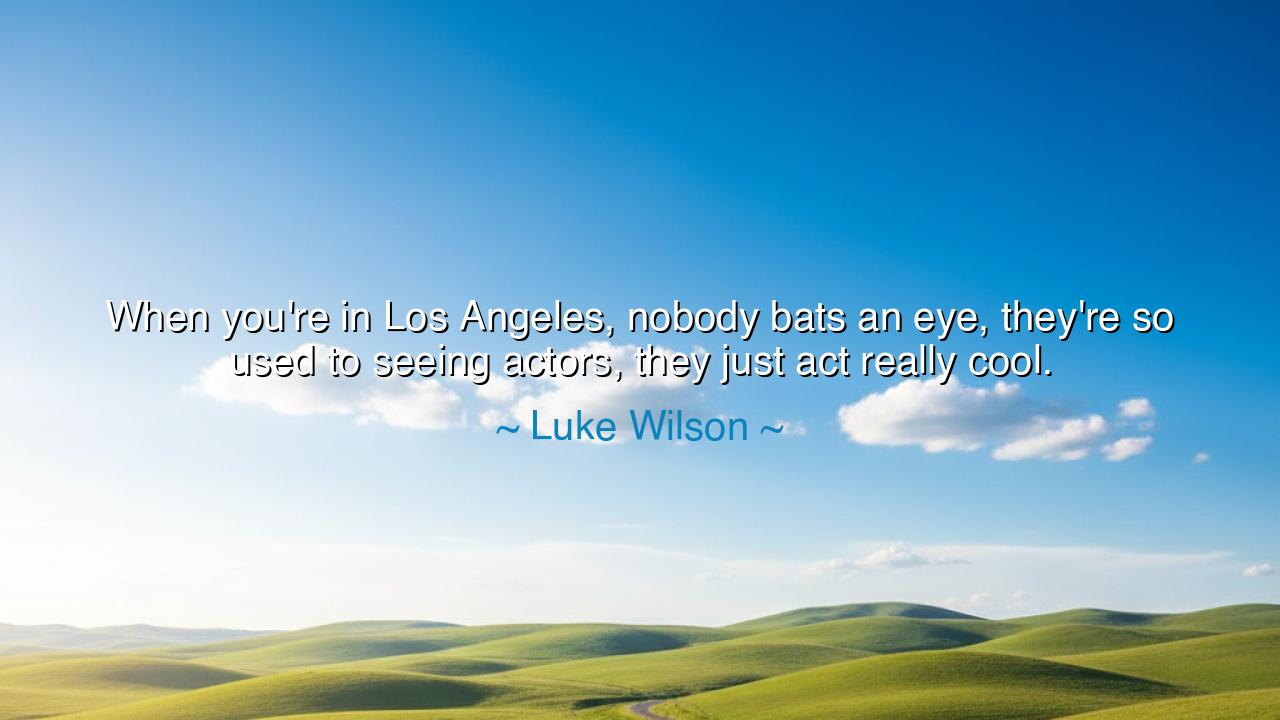
When you're in Los Angeles, nobody bats an eye, they're so used
When you're in Los Angeles, nobody bats an eye, they're so used to seeing actors, they just act really cool.





In the vast sea of humanity, there are places where the extraordinary becomes commonplace, where the awe that once accompanied greatness fades into the mundane. Luke Wilson, in his reflection on the nature of Los Angeles, says, "When you're in Los Angeles, nobody bats an eye, they're so used to seeing actors, they just act really cool." These words capture a truth about society—how familiarity breeds a kind of indifference, even to the most remarkable and impressive individuals. What was once astonishing becomes ordinary, and what was once revered becomes just another part of the backdrop of life.
In the ancient world, this phenomenon was not unknown. The Romans, for example, built a society that was filled with spectacles—triumphs, gladiatorial games, and public events that showcased the greatest warriors, orators, and athletes. Over time, however, these grand displays, which once stirred the hearts of the people, became routine. The Colosseum, with its magnificent shows, became just another place in the city where crowds gathered, accustomed to the violence and grandeur they witnessed. Much like the Romans, the people of Los Angeles have become desensitized to the presence of celebrities, for in a city built upon performance and fame, awe and adoration fade into the everyday.
Consider the great philosophers of ancient times, who often lived in cities where their wisdom was sought by many. Socrates, for instance, walked the streets of Athens, engaging with anyone who would listen. At first, his presence might have been revered, his words sought after by all, but over time, his influence became normalized. Yet, Socrates never allowed the familiarity of his role to dull the purpose of his mission. He understood that true wisdom transcends the shifting sands of popularity and familiarity. In the same way, actors in Los Angeles—like Socrates—become part of the fabric of the city, yet their true significance should not be lost simply because they have become part of the everyday scene.
This reality of familiarity breeding indifference is not just limited to cities of fame or spectacle. Throughout history, great individuals have often been overlooked or dismissed once their contributions became integrated into the culture. The greatness of Leonardo da Vinci, for example, was not immediately appreciated in his time. His innovations and artistic achievements, though remarkable, were overshadowed by the routine of daily life. It was only much later that his true genius was fully recognized. Like the actors in Los Angeles, Da Vinci's contributions were eventually absorbed into the collective consciousness, and the awe that once accompanied his work became familiar.
The lesson that Luke Wilson’s words convey is not one of cynicism toward celebrity, but a reminder of the nature of human perception. When something or someone becomes a part of our everyday lives, the initial awe tends to fade, and we may begin to overlook the significance of their presence. However, just as the ancients reminded us, greatness should not be measured by the awe of others, but by the lasting impact it has on society. Socrates, despite his ordinary walks through Athens, transformed the very foundation of philosophy. Leonardo da Vinci, though often overlooked in his own time, changed the course of both art and science. The true measure of greatness is not how it is perceived in the moment, but how it shapes the future.
In our own lives, we must ask: how often do we become desensitized to the greatness around us? How often do we fail to recognize the significance of those who may seem ordinary to us because they are so familiar? Whether it’s the contribution of a mentor, the sacrifice of a loved one, or the work of someone in our community, we must remember that greatness is not always celebrated in the moment. We must seek to understand that true greatness is often understated, even invisible, in the familiar aspects of life.
Let us learn from Luke Wilson’s reflection: not everything that becomes familiar is any less remarkable. We should strive to maintain awareness and appreciation for the extraordinary around us, recognizing the value of greatness not just when it stirs awe, but also when it quietly persists, embedded in the fabric of our lives. The next time we encounter someone or something that seems ordinary, let us pause and consider the deep impact they may have had, and the greatness they embody in their every action.






AAdministratorAdministrator
Welcome, honored guests. Please leave a comment, we will respond soon